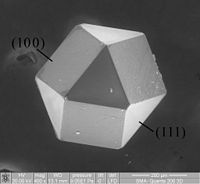
Photo from wikipedia
Personal accessories, such as glasses and watches that we usually carry in daily life, can yield useful information from the human body, while most are limited to exercise-related parameters or… Click to show full abstract
Personal accessories, such as glasses and watches that we usually carry in daily life, can yield useful information from the human body, while most are limited to exercise-related parameters or simple heart rates. Since those restricted characteristics might arise from interfaces between the body and items as one of main reasons, an interface design considering such factor can provide us with biologically meaningful data. Here, we describe three-dimensional (3D) printed, personalized multi-functional electronic eyeglasses (E-glasses), not only to monitor various biological phenomena, but also to propose a strategy to coordinate the recorded data for active commands and game operations for human-machine interface (HMI) applications. Soft, highly conductive composite electrodes embedded in the E-glasses enable to achieve reliable, continuous recordings of physiological activities. UV-responsive, color-tunable lenses using an electrochromic (EC) ionic gel offer the possibility of using both eyeglasses and sunglasses modes, and other components such as accelerometers provide the capability of tracking precise human postures and behaviors. Detailed studies of electrophysiological signals such as electroencephalogram (EEG) and electrooculogram (EOG) demonstrate the feasibility of practical uses as a platform of smart electronic glasses for future HMI systems.
Journal Title: ACS applied materials & interfaces
Year Published: 2020
Link to full text (if available)
Share on Social Media: Sign Up to like & get
recommendations!